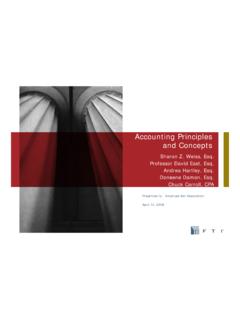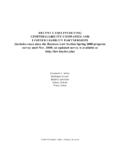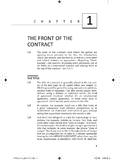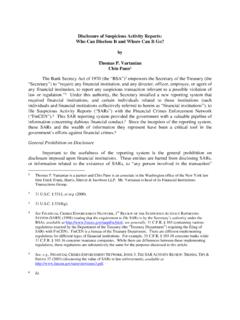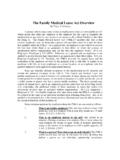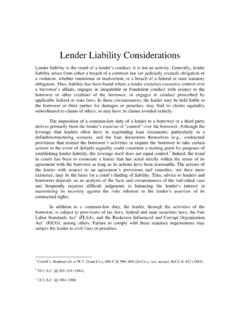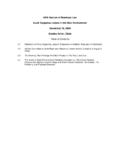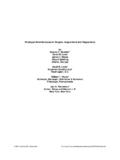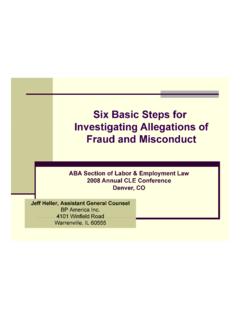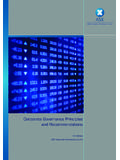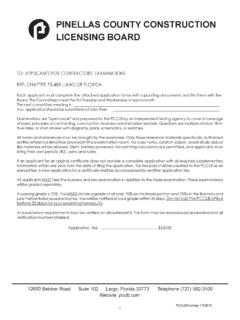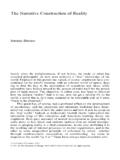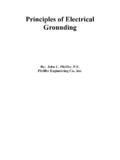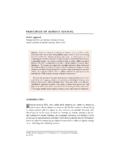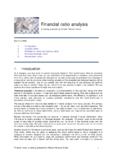Transcription of Basic Conflict of Laws Principles - American Bar …
1 1 Basic Conflict of laws PrinciplesRobert C. Lawrence, IIIE lisa Shevlin RizzoI. IntroductionThis chapter provides an overview of some of the Conflict of laws issues and attendant considerations that may arise in working with multinational It addresses opportunities available to the international investor under the laws of certain states of the United States. Specifically, it sets forth the extent to which courts of the United States enforce legal rights, obligations, or claims affecting a nonresident alien s assets located within the United States when such rights, obligations, or claims arise under the laws of foreign jurisdictions, which often are civil law.
2 The Principles of Conflict of laws provide guide-lines to determine whether a court of the forum jurisdiction will apply its law or the laws of another interested jurisdiction to a dispute. This inquiry often requires a court to make a choice that may be affected by public policy considerations of the forum jurisdiction. Conflict of laws Principles , moreover, may extend to many aspects of a case, such as judicial jurisdiction, 1. This chapter is adapted from ROBERT C.
3 LAWRENCE, III, INTERNATIONAL TAX AND ESTATE PLANNING ch. 1 (3d ed. 1999), which contains a detailed discussion of Conflict of laws issues in the context of international estate Conflict OF laws PRINCIPLES4characterization of property, choice of law, and the recognition and enforcement of foreign Conflict of laws IssuesA. Determining Affiliation1. IntroductionThe traditional ordering process for determining choice of law issues in common law jurisdictions is that the law of the jurisdiction of domicile governs the disposi-tion of personal property (often referred to as movables), and the law of the situs governs the disposition of real property (often referred to as immovables).
4 2 Civil law jurisdictions, however, often refer to nationality for determining choice of law issues. These three Principles are described DomicileThe determination of a client s domicile is the threshold question in determining many of the rights and obligations of the parties, the characterization of property, the validity and construction of a will, the place of probate, and other planning issues. Domicile is a legal construct that describes the relationship between an individual and a particular locality or country.
5 While there is no uniform definition of domicile, under the laws of most common law jurisdictions, domicile consists of two elements that must exist concurrently: (1) physical presence in the juris-diction and (2) the intent to remain This common law definition has been codified in one form or another in both federal and state laws . For example, under New York law, domicile is defined as a fixed, permanent and principal home to which a person wherever temporarily located always intends to return. 4 There are certain legal presumptions that are helpful to determine a person s domicile.
6 Domicile may be examined in terms of the following categories: domicile of origin, domicile by operation of law, and domicile of choice. Some common law jurisdictions recognize the concept of domicile of origin. Domicile of origin is the domicile the law assigns to each person at birth generally, the domicile of the father in the case of a legitimate child and of the mother in the case of an ille-gitimate Domicile may also be assigned by operation of law. For example, at common law, a married woman was presumed to have the same domicile as her However, this rule has evolved, and today, in most common law jurisdictions, a husband and wife may have different domiciles even if they are not 2.
7 Hereafter, the term movable is used in this chapter interchangeably with the term personal property, and the term immovable is used interchangeably with real property. 3. 25 AM. JUR. 2d Domicil 1 (2012); 28 Domicile 1 (2004). 4. SURR. CT. PROC. ACT 103[15] (Lexis Nexis 2012). 5. RESTATEMENT (SECOND) Conflict OF LAW S 14 (1971). 6. LAWRENCE, INTERNATIONAL TAX AND ESTATE PLANNING, supra note 1, 1 [B]II. Conflict of laws Issues5living apart from one another. A third type of domicile is domicile of choice.
8 One who is legally capable of changing his or her domicile may acquire a domicile of choice by being physically present in a new jurisdiction and possessing the intent to remain there domicile of choice, both elements must exist concurrently neither physical presence in the jurisdiction nor intention to remain alone is sufficient to effectuate a change in In determining whether the individual has the requisite intent, courts generally focus on factors such as the individual s social and business contacts, type of home, church membership, voting registration, place of driver s license and car registration, and other similar elements that dem-onstrate that the individual has a close and settled relationship with a particular locality.
9 Declarations of domicile whether formal declarations, such as in a will or trust instrument, or informal statements are also admissible as evidence but are given less weight because of the self-serving nature of such one s domicile may be difficult, in part because the concept of domicile resembles and is often confused with the concept of residence. Residence does not, however, generally involve the requisite attitude of mind and requires only physical presence in a particular locality or an actual place of abode Therefore, it is commonly said that a person can have several residences but only one Further confusing matters, the terms residence and domicile are often used interchangeably but with differing meanings in various types of In particular.
10 Tax statutes often cause confusion by using the Principles of residence and domicile for imposing taxes. A good example is the federal estate and gift tax scheme. The Internal Revenue Code adopts resi-dence as the basis of taxation, but the Treasury Regulations indicate that the term residence is to be interpreted to mean 7. 25 AM. JUR. 2d Domicil 6; RESTATEMENT (SECOND) Conflict OF LAW S 15. 8. 25 AM. JUR. 2d Domicil 14. 9. RESTATEMENT (SECOND) Conflict OF LAW S ch. 2, Special Note on Evidence for Establishment of a Domicil of Choice; see also Kjarstad v.
